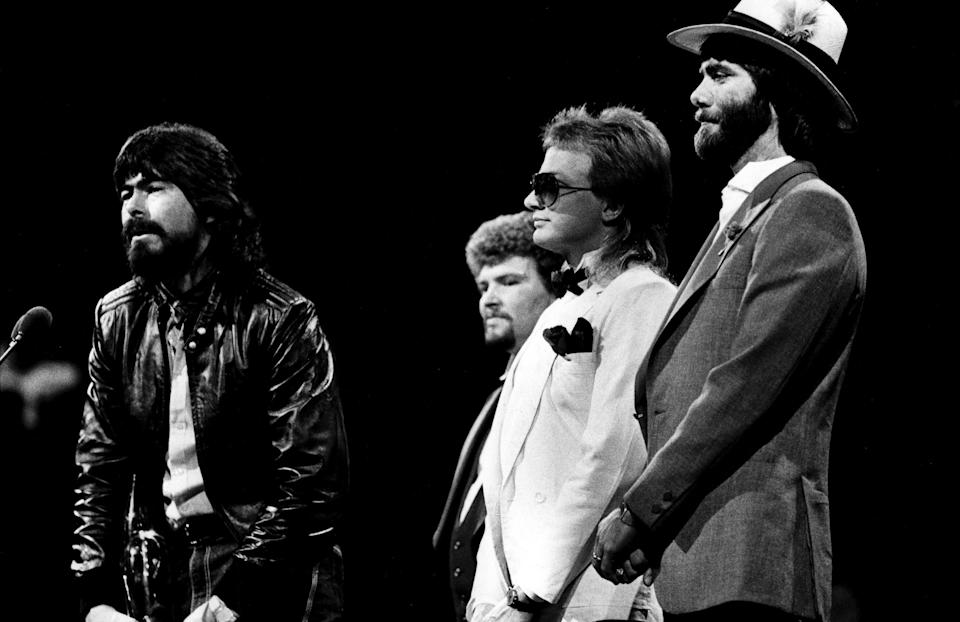
A vow said in plain clothes — “Forever’s as Far as I’ll Go” is the kind of promise you speak once, softly, and then spend a lifetime keeping.
When Alabama sent “Forever’s as Far as I’ll Go” to radio in October 1990, everything about it felt modest: a gentle tempo, a lyric without ornament, a vocal that sounds more like a conversation than a performance. Yet those quiet choices carried the song a very long way. Written by Mike Reid and issued as the third single from the band’s album Pass It On Down, it became Alabama’s 29th No. 1 country hit, holding the top for one week (the chart dated January 26, 1991) and staying on Billboard’s country tally for twenty weeks in all. In an era full of big choruses and flash, this little pledge of faith won with understatement.
The single’s paper trail tells the same story of unhurried confidence. Cut under the steady hands of producers Josh Leo and Larry Michael Lee, and tucked into the sturdy, grown-up palette of Pass It On Down, the track didn’t arrive with fanfare so much as with sure footing—another page in a band songbook that knew the value of speaking plainly. Depending on the pressing, the 45 backed “Forever’s as Far as I’ll Go” with either “Down Home” or “Starting Tonight,” two neighboring moods from the same album. Even the label minutiae—those alternate B-sides—feel like kitchen-table details, the little variations you only notice when a record has been handled and loved.
The lyric’s strength is its ordinary courage. “Forever’s as far as I’ll go” is not poetry straining for the heavens; it’s a promise that lives where the mail comes and the sink fills. Rather than piling up metaphors, the song makes a simple pledge and lets time be the witness: I will stay; I will choose you again tomorrow; I will do the small, faithful things that make the long years possible. For listeners who first met Alabama on a kitchen radio or a car stereo with the windows down, that matter-of-fact tenderness lands like a memory—of vows made in closets and courthouses, of dances in gymnasiums, of faces that have grown familiar and more beloved because they did not leave.
Musically, the band lets the vow breathe. Randy Owen sings with the soft focus of someone careful not to spook the moment; Jeff Cook and Teddy Gentry layer in harmonies that warm the edges without turning the promise into a spectacle. The arrangement doesn’t chase a big finish. It trusts the melody to carry a feeling you already know from your own life—the slow unclenching of a heart that’s been waiting to be told, plainly, it is safe now. In its modest way, the record acts like a photograph you keep framed on a dresser: it doesn’t call attention to itself, and yet you’d miss it if it were gone.
The backstory adds a quiet gleam. Mike Reid—the songwriter behind the lyric—has a craftsman’s ear for vows that sound like real speech; he writes for the kitchen table, not the balcony. Alabama’s decision to deliver his line without ornament is why the song has aged so kindly. You can hear the restraint everywhere: no grand key change, no ornamental solo, just the glow of players who know the difference between sentiment and sincerity. That’s the thread running through Pass It On Down, too—a record that leaned into grown-up subjects and textures, proof that Alabama could sit comfortably in the everyday, where most love actually lives.
It’s easy to file a No. 1 away as “just another hit,” especially in a run as astonishing as Alabama’s, but this one holds a special place because of who it speaks for. Plenty of love songs are about the rush at the beginning or the drama at the end; “Forever’s as Far as I’ll Go” is about the years in between. It’s the sound of a man discovering that devotion isn’t fireworks but habit—rings taken off and set in the same dish, prayers said over the same dinner table, arguments survived because leaving is not the plan. That is why older listeners so often claim this single as “the one that sounds like us.” It doesn’t flatter; it recognizes.
And the facts that bracket that feeling still matter. Written by Mike Reid; produced by Josh Leo and Larry Michael Lee; released October 1990 as the third single from Pass It On Down; No. 1 on Billboard’s country chart for one week in January 1991, 20 weeks total on the survey; alternately backed on 45 by “Down Home” or “Starting Tonight.” The rest is what the song continues to do when the needle lowers or the playlist finds it on a quiet evening: it steadies the room. Alabama understood that a promise doesn’t need to be loud to be large. This one whispers—and then keeps the house warm for years.